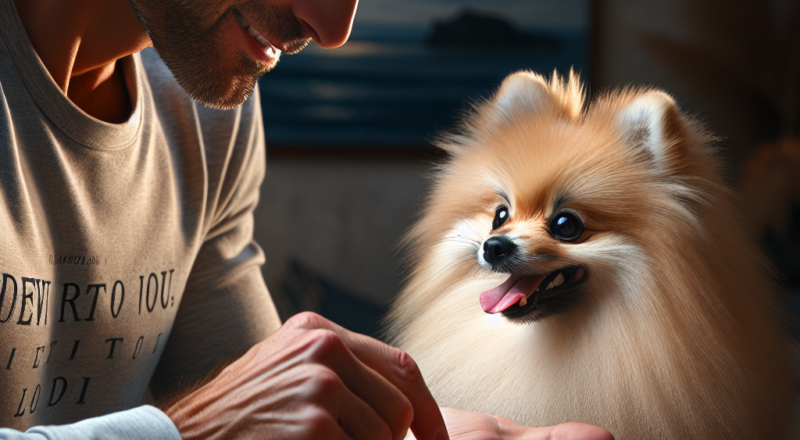The Pomeranian, affectionately known as the Pom, is a small breed of dog characterized by its fluffy double coat and vibrant personality. Originating from the Pomerania region in northeastern Europe, this toy breed is a descendant of large sled dogs and is related to the Spitz family. In this article, we’ll delve into everything you need to know about the Pomeranian, from their temperament and health care to their interactions with humans and other pets.
Characteristics and Temperament
Pomeranians are known for their lustrous and fluffy coats, which come in a variety of colors, including orange, black, white, and sable. Despite their small size, typically weighing between 3 to 7 pounds, Pomeranians possess a bold and spirited personality.
These dogs are highly intelligent and alert, making them excellent watchdogs. They are curious, playful, and affectionate, often forming strong bonds with their owners. Their energetic nature requires regular mental and physical stimulation, such as engaging toys and playful interactions.
Health and Nutrition
To maintain optimal health, Pomeranians should be fed a balanced diet rich in protein and essential nutrients. Proper portion control is crucial, as Pomeranians can be prone to becoming overweight if overfed. Regular veterinary check-ups and vaccinations are important to prevent and detect any potential health issues early on.
Common health concerns for Pomeranians include dental issues, luxating patellas, and tracheal collapse. Owners should ensure their pets receive routine dental care and gentle handling to avoid injuries.
Behavior with Children and Adults
Pomeranians are generally good with children, although their small size makes them more suitable for families with older kids who understand how to handle small dogs gently. They are also highly social with adults and can adapt well to various household environments, provided they receive ample attention and playtime.
Training and Socialization
Early socialization and training are essential for Pomeranians to develop well-rounded personalities. Use positive reinforcement techniques to teach commands and address any behavioral issues. Despite their independent streak, Pomeranians enjoy learning tricks and participating in training sessions.
Adoption and Care Costs
If you’re considering adopting a Pomeranian, numerous rescue organizations and shelters have adorable Poms looking for their forever homes. Adoption fees can be lower than purchasing from a breeder and often include vaccinations and spaying or neutering.
Owning a Pomeranian includes costs such as grooming appointments, high-quality food, veterinary care, and toys to keep them entertained. It’s important to budget for these expenses to ensure your Pom receives the best care possible.
Legal Considerations and Rights
Understanding local legislation and animal rights is crucial for Pomeranian owners. Ensure your pet is licensed and microchipped as required by local laws. Familiarize yourself with any breed-specific legislation that may affect your ability to own a Pomeranian in certain areas.
Saiba mais
- Pomeranians are known for their thick, fluffy fur and require regular grooming to prevent matting.
- This breed is highly intelligent and can pick up new tricks and commands quickly.
- Pomeranians tend to form strong bonds with their owners and can be anxious when left alone for extended periods.
- Despite their small size, Pomeranians have a bold personality and make excellent watchdogs.
- Adopting a Pomeranian from a rescue organization is a great way to give a dog a second chance.
- Pomeranians require regular dental care to prevent periodontal disease.
- Early socialization can help to manage their sometimes overly protective nature.
- Playing fetch and engaging in puzzle games are great ways to keep a Pomeranian mentally stimulated.
- Pomeranians typically live between 12-16 years, although some may live longer with proper care.
- Pomeranians enjoy being the center of attention and thrive in homes where they are included in family activities.
- Regular health checks are essential to catch any potential health issues early.
- Pomeranians are sensitive to heat and should not be left outdoors in hot weather.
- Positive reinforcement is the best approach for training and correcting unwanted behaviors.
- This breed enjoys socializing and can get along with other pets if introduced properly at a young age.
- Pomeranians come in a ‘teacup’ size, but potential owners should be cautious of breeders claiming this as an official size standard.
- Pomeranians need a moderate amount of exercise to prevent obesity and maintain muscle tone.
- This breed has a strong prey drive and may chase smaller animals if not adequately trained.
- Pomeranians may bark more than other breeds and require understanding of their vocal nature when living in apartments.
- Pomeranians can participate in agility courses, allowing them to use their intelligence and energy productively.
- Owners must be prepared for the time commitment of regular grooming to maintain their Pom’s coat.
Discover the secrets to a healthy and balanced diet for your dog with more than 40 delicious and nutritious recipes.
Clique na imagem abaixo para conhecer o produto:
The Pomeranian is one of the most recognizable toy breeds, known for its charming personality and adorable fluff. These small dogs, with their lively temperament and playful curiosity, make wonderful companions for families and individuals alike. This article explores everything you need to know about Pomeranians, from their history and care to their personality traits.
History of the Pomeranian
The Pomeranian breed descends from the German Spitz, and its name comes from the Pomerania region in northern Poland and northeastern Germany. Originally larger than today’s Pomeranians, the breed was used for herding and pulling sleds. The smaller version we see today became popular when Queen Victoria of England adopted one, bringing attention to the breed’s charming appearance and delightful disposition.
Specifications Table
| Attribute | Details |
|---|---|
| Height | 7.9 to 12.5 inches (20 to 32 cm) |
| Weight | 3 to 7.7 pounds (1.4 to 3.5 kg) |
| Life Expectancy | 12 to 16 years |
| Coat | Double coat, fluffy and thick |
| Colors | Variety of colors, including orange, black, cream, and blue |
| Temperament | Playful, friendly, extroverted, and intelligent |
Countries Where Pomeranians Are Popular
| Country | Popularity Level |
|---|---|
| United States | High |
| Canada | High |
| United Kingdom | Moderate |
| Australia | Moderate |
| Japan | Growing |
Choosing the Right Pet
When considering a Pomeranian, it’s essential to evaluate your lifestyle. These dogs thrive in active environments where they can engage in play and receive lots of attention. Consider adopting a Pomeranian if you can dedicate time for training, regular walks, and mental stimulation.
The Importance of Adoption
Adopting a pet can be a fulfilling experience. It not only gives a dog a second chance at a loving home but also helps reduce the number of dogs in shelters. The adoption process typically includes filling out an application, a home visit, and an adoption fee, which helps cover veterinary costs.
First Care After Bringing Them Home
Creating a safe and comfortable environment is crucial. Prepare your home by removing hazardous items, setting up a cozy bed, and having the necessary supplies, such as food and water bowls, toys, and grooming items.
Proper Nutrition
Feeding your Pomeranian the right diet is essential for its health. Look for high-quality dog food with balanced nutrients. Adult Pomeranians typically need about 1/2 to 1 cup of dry food daily, divided into two meals.
Hydration
Always provide fresh, clean water for your Pomeranian. Staying hydrated is vital for their overall health, especially during playtime.
Vaccination and Deworming
Vaccinations are essential to prevent diseases. Puppies generally receive their first vaccines around 6-8 weeks of age, followed by boosters. Regular deworming is also crucial to maintain their health.
Regular Veterinary Check-ups
Schedule annual or semi-annual visits to the vet for check-ups, vaccinations, and health screenings, ensuring your Pomeranian remains healthy and happy.
Hygiene
Regular grooming is vital for Pomeranians due to their thick coats. Brush their fur several times a week, bathe them as needed, and keep their nails trimmed.
Physical Exercise
Your Pomeranian needs daily exercise to stay fit and mentally stimulated. Short walks and playtime in a secure area are excellent ways to keep them active.
Play and Environmental Enrichment
Engage your Pomeranian in interactive games and provide toys that challenge their mind. Puzzle toys or simple fetch can provide both physical and mental stimulation.
Socialization
Expose your Pomeranian to various people, pets, and environments to foster good social behavior. Early socialization helps your dog become well-adjusted and confident.
Basic Training
Teaching your Pomeranian basic commands, such as sit, stay, and come, is crucial for safety and good behavior.
Managing Undesirable Behaviors
Recognizing and addressing issues like anxiety or aggression early on is vital. Consult with a trainer or behaviorist if needed.
Identification
Ensure your Pomeranian wears a collar with an ID tag and consider microchipping for added safety if they wander off.
Home and Street Safety
Prevent accidents by keeping potentially harmful items out of reach and always supervise your Pomeranian during outdoor activities.
Legal Considerations
Be aware of local regulations regarding pet ownership, which may include requirements for licenses and vaccinations.
Financial Considerations
Budgeting for your Pomeranian’s needs, including food, vet visits, grooming, and toys, is essential for responsible pet ownership.
Emotional Benefits
Having a Pomeranian can significantly enhance your emotional well-being, providing companionship and reducing stress.
Senior Care
Older Pomeranians may require special care regarding diet, exercise, and veterinary visits. Adjust their routines and consult the vet as needed.
Dealing with Loss
Coping with the loss of a pet can be heart-wrenching. It’s essential to allow yourself to grieve and remember the happy moments you shared.
Famous Pomeranian Owners
Many celebrities have been known to own Pomeranians, including the late pop star Michael Jackson and talk show host Ellen DeGeneres. Ellen often shared stories of her beloved Pomeranians, showcasing their quirky and playful nature on her show.
Transform Your Dog’s Behavior in Just Days!
If you’re struggling with your dog’s behavioral issues, consider exploring our solution. Transform the behavior of your dog in just a few days!



/hotmart/checkout_custom/10424f92-b07f-4561-bff4-bf470c0e4846/6t29rz3e.jpg)